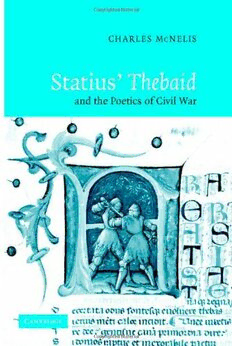
Statius' Thebaid and the Poetics of Civil War PDF
215 Pages·2007·1.789 MB·English
Most books are stored in the elastic cloud where traffic is expensive. For this reason, we have a limit on daily download.
Preview Statius' Thebaid and the Poetics of Civil War
Description:
This study focuses on ways in which Statius' epic Thebaid, a poem about the civil war between Oedipus' sons Eteocles and Polynices, reflects the theme of internal discord in its narrative strategies. At the same time that Statius reworks the Homeric and Virgilian epic traditions, he engages with Hellenistic poetic ideals as exemplified by Callimachus and the Roman Callimachean poets, especially Ovid. The result is a tension between the impulse towards the generic expectations of warfare and the desire for delay and postponement of such conflict. Ultimately, Statius adheres to the mythic paradigm of the mutual fratricide, but he continues to employ competing strategies that call attention to the fictive nature of any project of closure and conciliation. In the process, the poem offers a new mode of epic closure that emphasises individual means of resolution.
See more
The list of books you might like
Most books are stored in the elastic cloud where traffic is expensive. For this reason, we have a limit on daily download.
